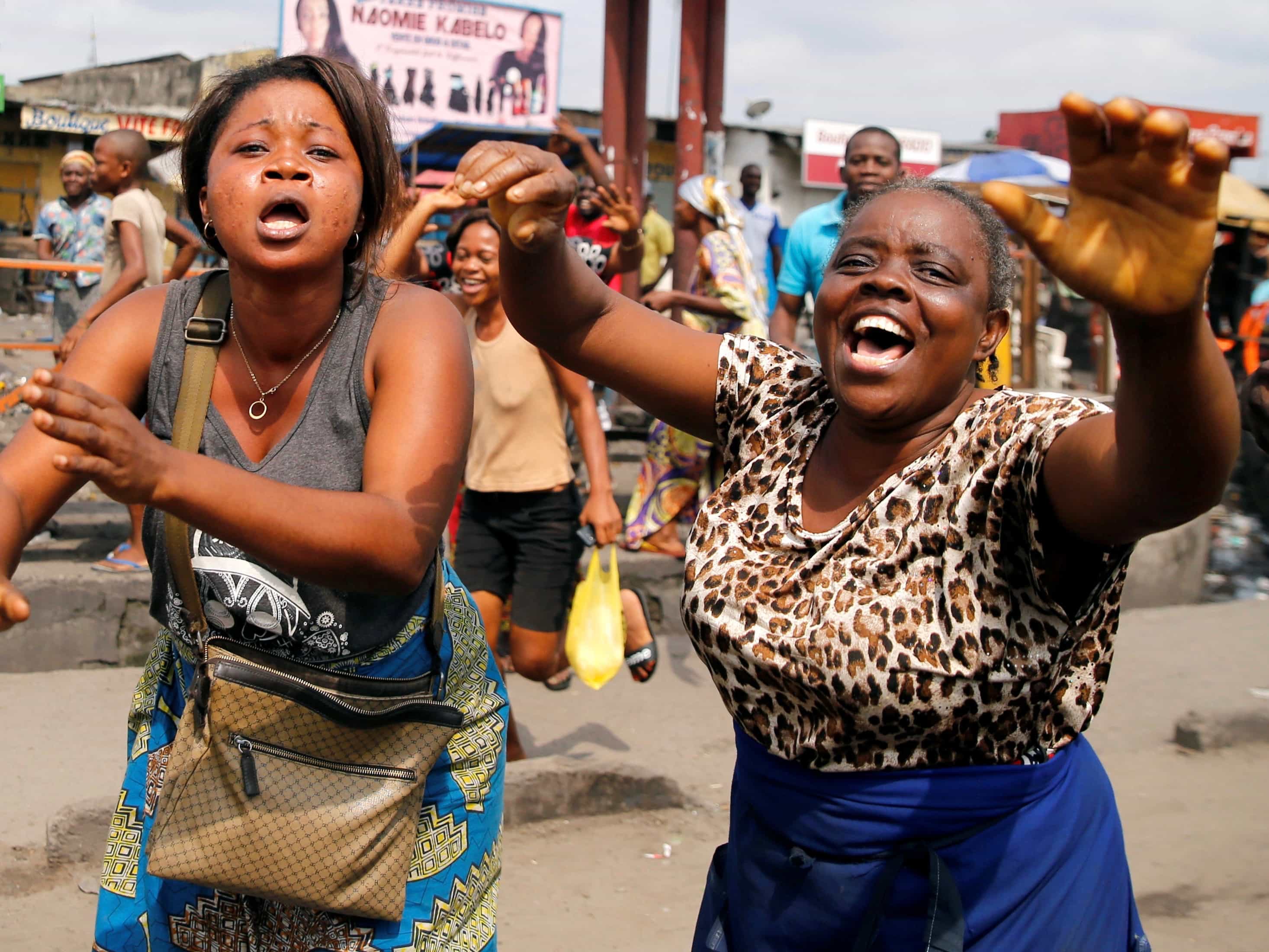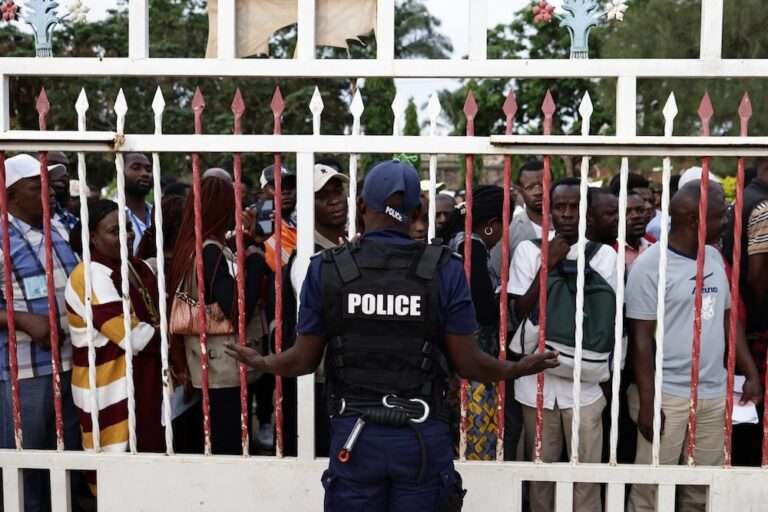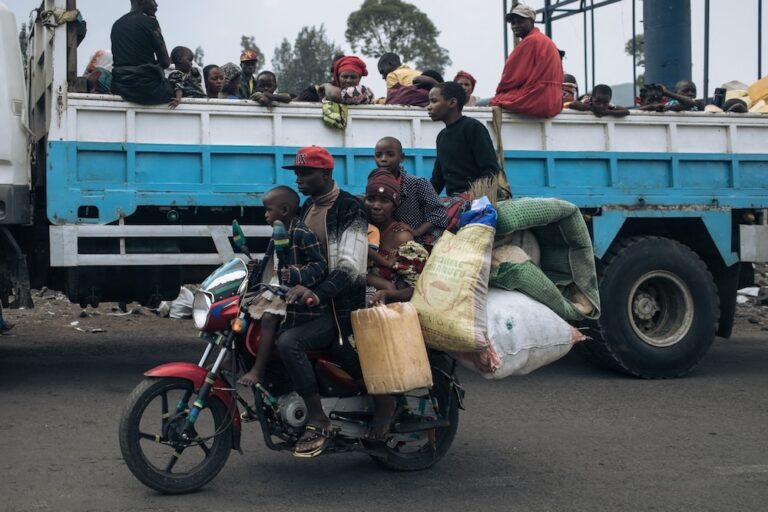In the cities of Kinshasa and Lubumbashi, military and police forces were heavily deployed and fired gunshots in some neighborhoods to disperse the whistling protesters. The actual number of victims is difficult to determine and reports are still being verified.
This statement was originally published on hrw.org on 20 December 2016.
By Ida Sawyer
Director, Central Africa
The Democratic Republic of Congo has become a powder keg, with whistling demonstrators facing off against security forces, and armed groups mobilizing as President Joseph Kabila’s mandate expires. Human Rights Watch has confirmed that security forces killed at least three people on Tuesday morning in the capital, Kinshasa, and scores more have been arrested since Monday morning, the last day of President Kabila’s constitutionally mandated two-term limit.
From about 10 p.m. on Monday, the “sound of whistles” pierced many neighborhoods of Kinshasa. Groups had taken to the streets, whistling to send the message to Kabila that his time in office would be up at midnight. A “concert of whistles” was also heard in parts of the southern city of Lubumbashi.
In both cities, military and police forces were heavily deployed and fired gunshots in some neighborhoods to disperse the whistling protesters. The actual number of victims is difficult to determine and reports are still being verified. Many witnesses told us about door-to-door searches by Republican Guard soldiers, with youth being arrested from their homes, and about unusual checkpoints where security forces stopped people on the roads, questioning them about potential ties to the political opposition, confiscating money and cellphones. The whistling protests – and the crackdown – were strongest in the Kinshasa neighborhoods of Selembao, Mont Ngafula, Kimbangu, Ngiri-Ngiri, Ndjili, Masina, Matete, and Lemba, and in the Lubumbashi neighborhood of Kenya.
Early on Tuesday morning, the long-time opposition leader and president of the Union for Democracy and Social Progress (UDPS) political party and Rassemblement coalition Etienne Tshisekedi delivered a video message posted on YouTube, with “a solemn appeal to the Congolese people to not recognize the…illegal and illegitimate authority of Joseph Kabila and to peacefully resist [his] coup d’état.”
Further protests have since erupted in many parts of Kinshasa and Lubumbashi. Security forces have responded in many areas by firing live bullets and teargas. We’ve received reports of many people killed and wounded this morning by the security forces, which we’re still working to confirm. And the reports of arrests continue.
In Kinshasa, protesters burned the headquarters of the ruling People’s Party for Reconstruction and Democracy (PPRD). And there are reports that protesters beat police officers in Lubumbashi.
Monday’s ‘Villes Morte’
The protests that began Monday night followed what turned out to be largely a “ville morte” or general strike in Kinshasa and other cities on the last day of Kabila’s mandate. Military, police, and intelligence agents were heavily deployed in cities and towns across the country – including Kinshasa, Goma, Lubumbashi, Bunia, Beni, Walikale, Kindu, Uvira, Kalemie, Mbuji-Mayi, Mbandaka, and Lisala – in an apparent attempt to suppress protests. Many residents kept their children home from school and stayed indoors with shops and businesses closed.
Some people still attempted to protest. In the eastern town of Beni, security forces fired in the air to disperse demonstrators, though a protester was injured by a stray bullet. Human Rights Watch received credible reports of at least 94 people arrested on Monday, including 41 in Goma, 28 in Kinshasa, 19 in Bunyakiri, around a dozen in Beni, five in Bukavu, and one in Kalemie. Most were arrested while protesting, planning to protest, while gathered outdoors in groups, or just for wearing red – which has become a symbol of Kabila’s “red card” or final warning.
#CongoCrisis: Crackdown continues, @hrw has now received credible reports of at least 41 arrests in #Goma today #DRC pic.twitter.com/yGG8Y3I4fJ
— Ida Sawyer (@ida_sawyer) December 19, 2016
Eleven members of the Rassemblement opposition party coalition were arrested as they were peacefully marching down the street in the center of Goma – including representatives of the Engagement for Citizenship and Development (ECIDE), Social Movement for Renewal (MSR), National Party for Development and Democracy (PND), and UDPS political parties. They were arrested in the presence of a team of United Nations human rights observers and transferred to the police intelligence prison. The human rights observers were later denied access to them.
LUCHA activist Fabrice Mutsiirwa was arrested in Goma at about 9 a.m. on Monday. Another LUCHA activist Adolf Miruho was arrested when visiting Fabrice in detention on Tuesday morning. A third LUCHA activist, Bienfait Katalanwa, was abducted on Sunday by four men in civilian clothes and released on Monday evening.
In Kinshasa, security forces in large numbers deployed outside the University of Kinshasa, blocking students from protesting during a standoff that lasted several hours on Monday morning. In the afternoon, authorities in Kinshasa arrested Franck Diongo, president of the opposition party Movement of Progressive Lumumbists (MLP) and a member of the Rassemblement, after he and his colleagues apprehended three men who, according to Diongo, were Republican Guard soldiers wearing civilian clothes. Diongo said he feared they had been sent to attack him.
Early on Monday morning in the eastern town of Butembo, militia fighters clashed with security forces, killing a reported 13 people, including a UN peacekeeper. In Manono in the former Katanga province, at least 40 people were wounded during an attack allegedly carried out by a Batwa militia on Monday night, according to the UN. Fighting has also been reported on Tuesday between a militia group and the Congolese army in the southern city of Kananga. While it is too early to know the exact circumstances of these attacks, the heightened armed group mobilization amid the country’s volatile political context is very evident.
As part of a broader crackdown on the media, authorities blocked the signals for the Congolese news outlets close to the opposition, Canal Congo TV (CCTV) and Radio Liberté Kinshasa, on Monday morning. The signal for Radio France Internationale (RFI), the most important international news outlet in Congo, has been blocked in Kinshasa since November 5. The RFI signal from neighboring Brazzaville has been jammed since November 18.
In the midst of it all, at 11:45 p.m. on Monday – as the whistle blowing, banging of pots and pans, and cries that Kabila should leave office were escalating – the news anchor on Congo’s government-run national television station announced that Kabila had signed a decree, appointing some 60 new ministers to the government to be led by Prime Minister Sami Badibanga. The new government only includes members of Kabila’s ruling coalition and the opposition parties that participated in the African Union-mediated national dialogue. Members of the Rassemblement coalition and other opposition parties that only took part in the ongoing Catholic Church-mediated dialogue have no posts.
The midnight announcement may have been made to distract from the growing calls for Kabila to step down, while also showing that the country is still being governed. Some have also viewed it as an affront toward, or dismissal of, the Rassemblement and the Catholic Church-mediated talks.
In another apparent attempt to maintain the façade that everything is under control, Kabila’s diplomatic advisor Kikaya Bin Karubi held a press conference in Kinshasa on Monday afternoon, where he stated that “President Kabila will still be in power tomorrow.” He said that “only the population could put pressure on President Kabila,” and “as far as [he] can tell, that isn’t happening.”
Also on Monday, three UN experts called on the authorities to lift “abusive” restrictions on protesters, including an unlawful ban and a crackdown on social media. “The targeted repression of dissenting voices of civil society and human rights defenders is contrary to democratic principles,” the experts noted. “If civil society is not allowed to exercise the rights of freedom of expression, freedom of association and peaceful assembly, protesters will inevitably resort to violence, for which only the authorities are to be blamed.” The government of France also expressed its concern Monday about the deteriorating human rights situation in the country.



